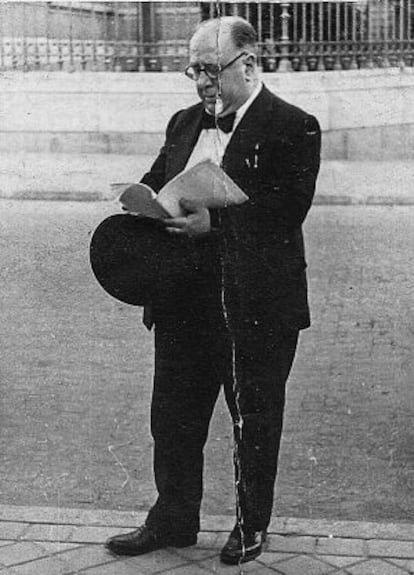Youngest Machado brother's poetry sees the light
Francisco's verses published 62 years after his death


In 1939, all four Machado brothers crossed the Spanish border into exile, with the exception of Manuel, who on July 18, 1936, had found himself trapped at Burgos station waiting for a train that never came. After that he was jailed, and finally forced to sell his soul by writing a poem in praise of Franco. Francisco, the youngest of the four, made it into France with his wife and three children separately from the others. The brothers had last met in Catalonia, during the evacuation.
Francisco, a prisons director and a liberal who believed in "hating the crime and feeling compassion for the criminal," had been moved around as the Republic retreated to remain close to his family. He seemed destined for exile like the others. But Mercedes Martínez, his wife, convinced him that running away was meaningless. If he had done nothing wrong, what could happen to them? Many Republicans thought this way, and turned back from France. Some of them paid dearly. Francisco Machado was almost one of these. "Coming back into Spain, they threatened to put my father in a concentration camp, and my mother reacted like a lioness," says their daughter Leonor Machado in Madrid.
Somewhat against his own expectations, the prisons director escaped imprisonment. The Franco authorities subjected him to the scrutiny they applied to all public employees to weed out hostile elements. "Since he had had no political posts they allowed him back, though not as director." Of her father, Leonor remembers the kindness typical of all the Machados, praised by Antonio in an autobiographical verse. Despite the brutal line of the new regime, Machado stuck to his principles. Treating prisoners decently caused him problems with superiors; on the other hand, some prisoners changed the date of their escape plans so as to ensure he would not be on guard at the time and suffer for it.
Beside his brothers he is a minor poet, but he is still a Machado"
Francisco was born in Madrid in 1885, and by the time he was old enough to go to university, the family money had drained away. He had to work to get through law school. But without doubt what most shaped him was having an inclination to write poetry at the same time as having a brother called Antonio who was a major poet and another, Manuel, also a poet, whose fame has since been obscured, more for political than literary reasons. Francisco, his daughter says, was not envious and often recited his brothers' works around the house, though not in front of Antonio, who hated to hear his verses recited. To write, he sought the public privacy of a café. He was not intimidated by his brothers' fame, but he never published his own poems. His only published work dealt with the legends of Toledo. Now, 62 years after his death, Leonor has brought together his principal writings in a small volume published by Ediciones de la Torre. "Beside his brothers he is a minor poet, but he is still a Machado," says the publisher, José María Gutiérrez de la Torre.
"Despite their official jobs, Antonio and Manuel saw themselves as professional writers, but my grandfather was an amateur, who wrote when and what he wanted," says his grandson, Manuel Álvarez Machado. "His work is more irregular; some poems are fantastic, others less so."
Tu suscripción se está usando en otro dispositivo
¿Quieres añadir otro usuario a tu suscripción?
Si continúas leyendo en este dispositivo, no se podrá leer en el otro.
FlechaTu suscripción se está usando en otro dispositivo y solo puedes acceder a EL PAÍS desde un dispositivo a la vez.
Si quieres compartir tu cuenta, cambia tu suscripción a la modalidad Premium, así podrás añadir otro usuario. Cada uno accederá con su propia cuenta de email, lo que os permitirá personalizar vuestra experiencia en EL PAÍS.
¿Tienes una suscripción de empresa? Accede aquí para contratar más cuentas.
En el caso de no saber quién está usando tu cuenta, te recomendamos cambiar tu contraseña aquí.
Si decides continuar compartiendo tu cuenta, este mensaje se mostrará en tu dispositivo y en el de la otra persona que está usando tu cuenta de forma indefinida, afectando a tu experiencia de lectura. Puedes consultar aquí los términos y condiciones de la suscripción digital.








































